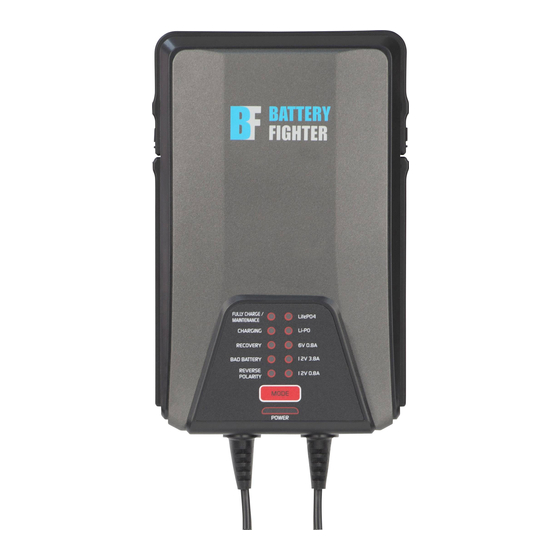Battery Fighter bca1702wr Manuel d'instruction
Parcourez en ligne ou téléchargez le pdf Manuel d'instruction pour {nom_de_la_catégorie} Battery Fighter bca1702wr. Battery Fighter bca1702wr 10 pages. Intelligent battery charger for both lead acid & lithium (lipo & lifepo4) 12v automotive batteries

INSTRUCTION MANUAL
THIS MANUAL CONTAINS IMPORTANT SAFETY AND OPERATING INSTRUCTIONS. PLEASE SAVE THESE
INSTRUCTIONS. KEEP WITH OR NEAR CHARGER AT ALL TIMES.
WARNING – RISK OF EXPLOSIVE GASES.
1.
a.
Working in the vicinity of a lead-acid battery can be dangerous. Batteries generate explosive
gases during normal battery operation.
b.
For this reason it is of the utmost importance that prior to each use of your charger, you read and
follow the instructions provided exactly:
c.
The appliance is not intended for use by young children or infirm persons without supervision.
Young Children should be supervised to ensure that they do not play with the appliance.
2.
To reduce risk of a battery explosion, follow these instructions and those marked on the battery.
3.
NEVER smoke or allow an open spark or flame in the vicinity of the battery or engine.
CAUTION – To reduce the risk of injury, use the charger for charging a rechargeable lead-acid battery only. It is not
4.
intended to supply power to a low-voltage electrical system or to charge dry-cell batteries. Charging dry-cell
batteries may cause them to burst and cause injury to persons and damage to property.
5.
Do not expose the charger to moisture, rain or snow. For indoor use only.
6.
Use of an attachment not recommended or sold by the battery charger manufacturer may result in a risk of fire,
electric shock, or injury to persons.
7.
To reduce risk of damage to electric plug and cord, pull by plug rather than cord when disconnecting the charger.
8.
Make sure cord is located so that it cannot be stepped on, tripped over, or otherwise subjected to damage or stress.
Study all the battery manufacturers' specific precautions such as removing or not removing cell caps while charging
9.
and recommended rates of charge.
10. Do not use the battery charger unless the battery voltage matches the output voltage rating of the charger.
11. Do not operate the charger in a closed-in area or restrict ventilation in any way.
12. An extension cord should not be used unless absolutely necessary. Use of improper extension cord could result in a
risk of fire and electric shock. If extension cord must be used, make sure:
a.
That pins on the plug of extension cord are the same number, size and shape as those of plug on charger;
b.
That extension cord is properly wired and is in good electrical condition;
c.
That wire size is as specified below.
Length of Cord (Feet)
AWG Size of Cord
13. Do not operate the charger with damaged cord or plug. If the supply cord cannot be replaced and the cord is
damaged, the appliance should be scrapped.
14. Do not operate the charger if it has received a sharp blow, been dropped, or otherwise damaged in any way. Take it
to a qualified repair station or local dealer.
15. Do not disassemble the charger. Take it to a qualified repair station or local dealer when service or repair is required.
Incorrect reassembly may result in a risk of electric shock or fire.
16. To reduce risk of electric shock, unplug the charger from an outlet before attempting any maintenance or cleaning.
PERSONAL PRECAUTIONS:
a.
Someone should be within range of your voice or close enough to come to your aid when you work near a lead-acid
battery.
b.
Have plenty of fresh water and soap nearby in case battery acid contacts skin, clothing, or eyes.
c.
Wear complete eye protection and clothing protection. Avoid touching eyes while working near battery.
d.
If battery acid contacts skin or clothing, wash immediately with soap and water. If acid enters an eye, immediately flood
BCA1702WR - 140717
25'
50'
100'
150'
18
18
18
16
